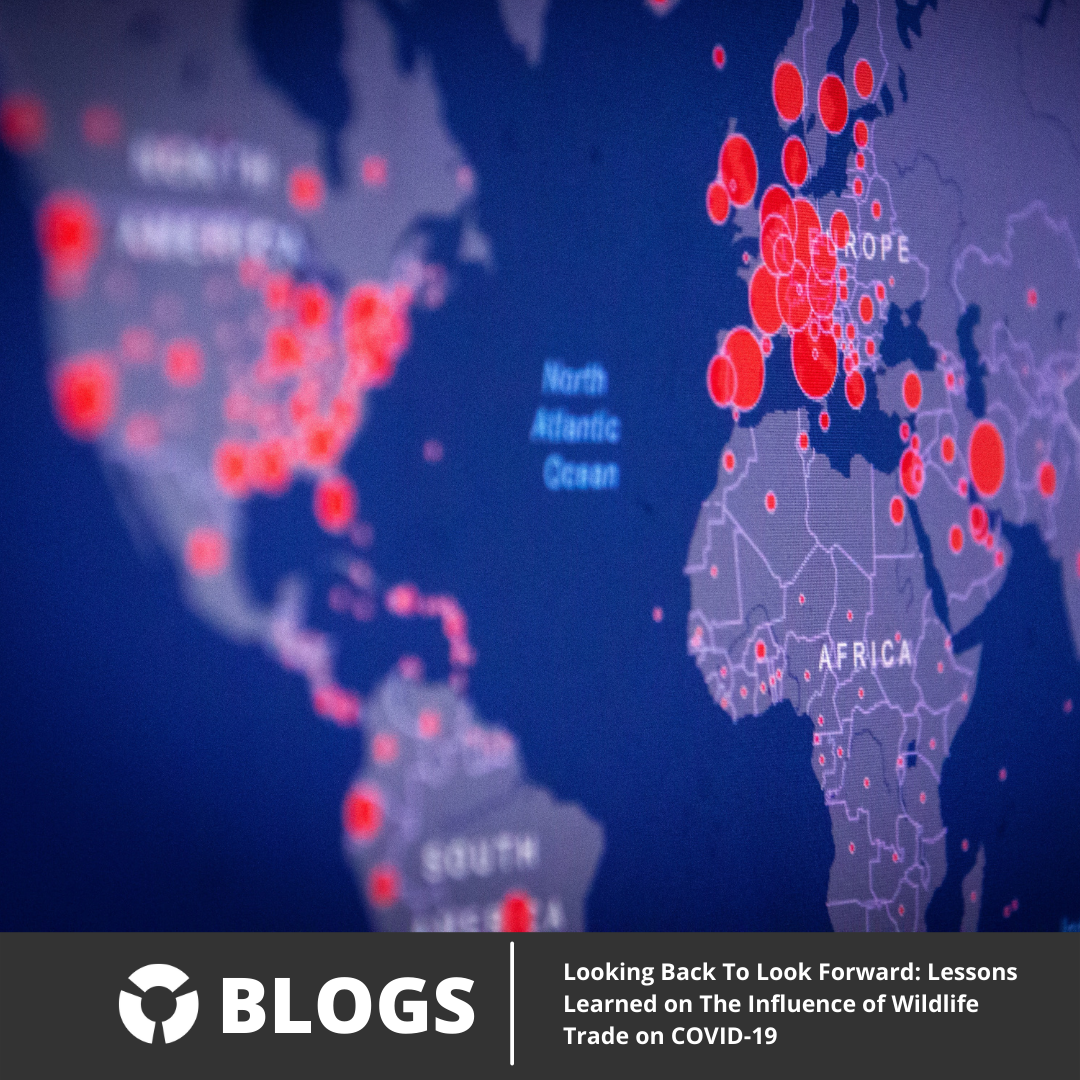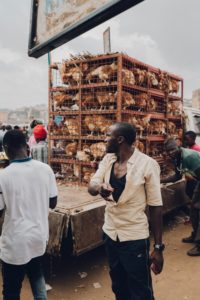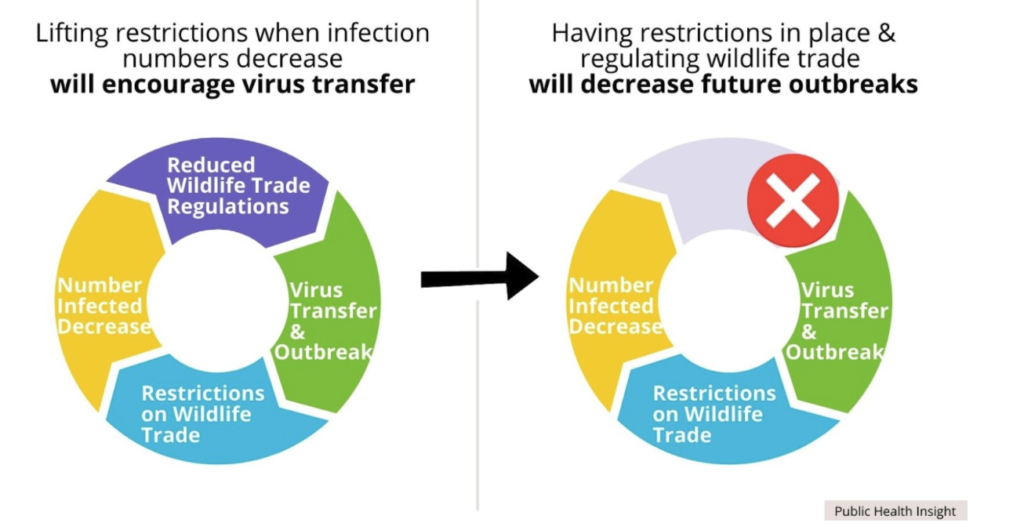
18/11/2021
“Human health is animal health and environment health, all at the same time”
– Gordon Thane , Public Health Insight
In Episode 3 -Wildlife Trade & Coronavirus of Public Health Insight’s podcast, we examine the video “How wildlife trade is linked to coronavirus” by Vox. After learning about how wet markets and wildlife trade are linked to the coronavirus, we look into the discrimination and narratives involving the outbreaks, then discuss future steps to prevent future zoonotic outbreaks.
In this blog post, we’ll be highlighting…
The Vox Video: “How wildlife trade is linked to coronavirus”
In the 1970’s there was a great famine in China. With the government unable to feed its population of 900 million, it permitted private farming which enabled major agricultural companies to take over the production of common food like chicken and pork. Helpless against the large companies, small farmers began sustaining themselves by farming wildlife animals such as turtles.
As more people relied on this form of farming , the government enacted a new law in 1988 which encouraged the domestication, breeding, and farming of wildlife. Small scale farms soon became industrial sized operations while a variety of wild animals were bred and sent to wet markets to be sold for profit.

Practiced all around the world, wet markets consist of animals in stacked cages to have the most animals in the smallest amount of space. As excrement, blood, and pus fall from the top animal to the bottom, so do their viruses and bacteria.
Whether to fight disease or strengthen your body, the wildlife trade industry promoted its wild animal products very well. So much so that endangered animals were trafficked for their supposed benefits, growing the illegal wildlife trade industry.
As this industry was expanding, so were the viruses in the wild animals. Animals that would have rarely made contact in the wild now had exposure to each other in the farms and in the stacked cages at wet markets. This exposed their viruses to each other, which then evolved and moved onto other animals.
When humans have contact with these animals at wet markets or when they consume them, they become exposed to viruses that their immune system cannot fight alone. Unlike the host species that can live after being infected with the virus, humans cannot.
The Importance of Perspective: Xenophobia In The Context of COVID-19
Unfortunately, the pandemic has brought upon xenophobic comments and racist acts against East and Southeast Asians. As mentioned in the Vox video, the majority of the population in China do not eat wild animals. Those who usually do eat these animals are the rich and influential, a minority compared to those of lower socioeconomic status that do most of the labour involved in trading, but do not eat wild animals themselves.
Whether through threatening comments or physical attacks, the discrimination is not fair to the people of China, as they themselves are victims of the conditions that led to the pandemic. There is no justification for the discriminatory acts.
We must think critically about the narratives we come across. When do the narratives change? Who do they change for? How do they change? The swine flu had originated in North America, yet it was not commonly called the North American virus.
Throughout history, groups that were considered outsiders were often associated with diseases (Burton, 2020), or in this case, a virus. This notion stems from ethnocentristic thinking, where one has the belief that their culture is far superior to others, and this is later translated into biased articles, xenophobic comments, and racist acts.
When reading about the different practices around the world, we must look at other cultures through their perspective, while also acknowledging our own biases. The Vox video analyzed in this podcast presented the topic in a way that was neutral and unbiased. This is one of the first steps in creating sustainable solutions.
Considering The Future: Sustainable Solutions & The One Health Model
After the SARS outbreak in 2003, the government of China closed wet markets as well as wildlife farming. Though the wildlife trade industry makes up a small portion of the country’s GDP, the industry was able to use its great lobbying power and support of affluent people to take away restrictions and even legalize the farming of endangered animals. This pattern can be seen again during the COVID-19 pandemic, as wet markets have been closed and wildlife trade temporarily banned.
The Vox video suggests banning wildlife trade altogether, yet that suggestion fails to consider the livelihoods of those that work in the trade. It also does not consider the likelihood of the trade being moved to the black market, where the products will be poorly regulated but with greater value. This may encourage people to engage more in the market and risk another outbreak.

A multidisciplinary model such as the One Health model can be used in this situation, as its multidisciplinary approach consists of including key stakeholders that would be affected by any policies or service change. This would include doctors, nurses, and public health practitioners from the public health arena, ecologists and wildlife experts from the environmental sector, the agriculturists and vets involved in animal health, as well as workers from the wet markets. By including stakeholders in the discussion and creating strict restrictions and regulations for the wildlife trade, such as banning stacked cages, we can continue supporting the workers while also preventing the occurrence of another outbreak.
The pandemic has reminded us that we are all part of a global community. Animal health and environmental health are both key factors that contribute to human health and having a holistic approach would help lead to more sustainable solutions.
Burton, N. (2020, February 07). The coronavirus exposes the history of racism and “cleanliness”. Vox. https://www.vox.com/2020/2/7/21126758/coronavirus-xenophobia-racism-china-asians
Other Related Material
Illicit Wildlife Trade, Wet Markets, and COVID‐19: Preventing Future Pandemics (World Medical & Health Policy Journal): https://www.ncbi.nlm.nih.gov/pmc/articles/PMC7362142/